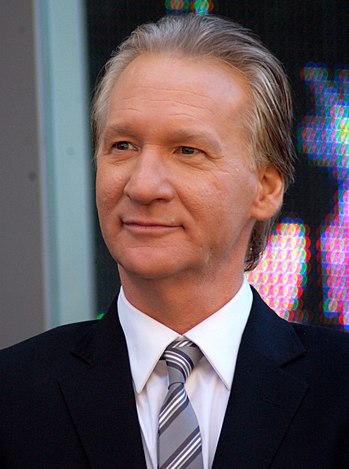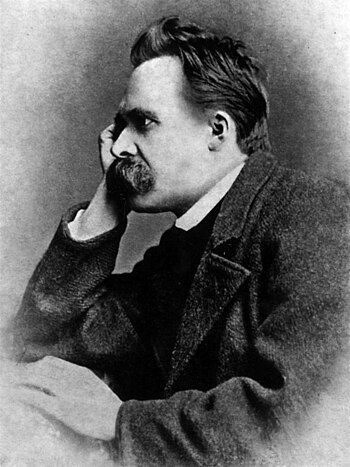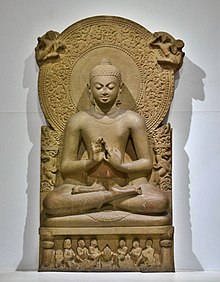[this is a sample of text from the book “Living on the edge” by Jonathan Burke]
Bill Maher proves atheism does not guarantee rational thinking

Bill Maher attending a ceremony to receive a star on the Hollywood Walk of Fame. (Photo credit: Wikipedia)
Arch-skeptic Bill Maher, famous for his anti-religious stance, has spoken out repeatedly in opposition to Western medicine, in particular against vaccination. In his show ‘Real Time With Bill Maher’ (4 March, 2005), Maher said he did not believe in vaccination, and made the false claim that Louis Pasteur had recanted the germ theory of disease.[1]
In his comments on the Larry King Live show (15 December, 2005), Maher claimed that ‘A flu shot is the worst thing you can do’, that flu vaccinations don’t prevent flu, and that repeated flu shots increase the risk of Alzheimer’s disease.[2]In a 2008 interview on ‘Late Night With David Letterman’, Maher opposed Western medicine and dismissed medical journals.[3]
In an interview on his own show with a heart surgeon (9 October 2009), Maher denied the efficacy of the swine flu vaccine, denied the value of vaccines, and expressed doubt that the swine flu was dangerous.[4] [5]
During the same show, Maher expressed the view that pregnant women should not receive the swine flu vaccination.[6] In a later interview with HBO, Maher insisted he does not deny the germ theory of disease, nor that vaccines can be efficacious in some circumstances, but still maintained his anti-vaccination stance and said he would not be vaccinated himself.[7]
Maher also wrote an enthusiastic endorsement of the book ‘What If Everything You Thought You Knew about AIDS Was Wrong?’ (4th rev. ed. 2006), by Christine Maggiore.[8] Maggiore’s book denied that HIV causes AIDS, and insisted that people who appear to die from AIDS-related complications in fact die from lack of general health, and illness caused by factors unrelated to HIV or AIDS.[9] Maggiore’s claims have been dismissed by the professional medical consensus, and she was condemned by doctors for contributing to AIDS-related deaths resulting from promotion of her ideas.[10]
In 2009 the Atheist Alliance International presented Maher with the ‘Richard Dawkins Award’ (an award unrelated to Dawkins’ own ‘Richard Dawkins Foundation for Reason and Science’). The award is granted each year to ‘an outstanding atheist’ on the basis of criteria including the promotion of ‘public awareness of the nontheist life stance’, and the advocating of ‘increased scientific knowledge’.[11]
This decision was publicized and criticized widely by a number of high profile atheists and skeptics.[12] [13] [14] [15] [16] On 21 July 2009, Richard Dawkins posted a response pointing out that the award had been granted by an organization unrelated to his own, but acknowledged he had been contacted over the decision, agreed with it, and defended it.[17] Dawkins’ defense of the award has also been criticized by prominent skeptics.[18] [19] [20]
________________________

Albert Edelfelt – Louis Pasteur – 1885 (Photo credit: Wikipedia)
[1] ‘I don’t believe in vaccination either. That’s a… well, that’s a… what? That’s another theory that I think is flawed, that we go by the Louis Pasteur theory, even though Louis Pasteur renounced it on his own deathbed and said that Beauchamp(s) was right: it’s not the invading germs, it’s the terrain. It’s not the mosquitoes, it’s the swamp that they are breeding in.’, transcript, ‘Real Time With Bill Maher’, 5 March, 2005.
[2] ‘MAHER: I’m not into western medicine. That to me is a complete scare tactic. It just shows you, you can… KING: You mean you don’t get a — you don’t get a flu shot? MAHER: A flu shot is the worst thing you can do. KING: Why? MAHER: Because it’s got — it’s got mercury. KING: It prevents flu. MAHER: It doesn’t prevent. First of all, that’s… KING: I haven’t had the flu in 25 years since I’ve been taking a flu shot. MAHER: Well, I hate to tell you, Larry, but if you have a flu shot for more than five years in a row, there’s ten times the likelihood that you’ll get Alzheimer’s disease. I would stop getting your… KING: What did you say? MAHER: That went better in rehearsal but it was still good. Absolutely, no the defense against disease is to have a strong immune system. A flu shot just compromises your immune system.’, transcript, Larry King Live, 15 December, 2005.
[3] ‘Maher: You know, I do love health as an issue. This is what I read about when I have time off. Letterman: Are you interested in medical journals and that sort of thing? Maher: Not Western medicine, I think we’re being poisoned…I would love for you to investigate the possibility that your health issues might have arisen from the fact that you’re being poisoned by America.’, transcript, Late Night With David Letterman (2008).
[4] ‘Mr. Maher: Why would you let them be the ones to stick a disease into your arm? I would never get a swine flu vaccine or any vaccine. I don’t trust the government, especially with my health. Dr. Frist: On the swine flu, I know you really believe that. And let me just … Mr. Maher: (interrupting) You say that like I’m a crazy person. Dr. Frist: Well, here you are. I think here you are.’, transcript, ‘Real Time With Bill Maher’, 9 October, 2009.
[5] ‘Mr. Maher: This is not a very serious flu. Let’s be honest. There must be something more to this. I cannot believe that a perfectly healthy person died of this swine flu. That person was not perfectly healthy. Western medicine misses a lot.’, ibid.
[6] ‘Dr. Frist: I know you don’t believe this, but I’m telling you the facts. Because if you send a signal out telling pregnant women not to get this vaccine … Mr. Maher: (interrupting) I do. Dr. Frist: Well, you’re wrong. I’m serious.’, ibid.
[7] ‘What I’ve read about what they think I’m saying is not what I’ve said. I’m not a germ theory denier. I believe vaccinations can work. Polio is a good example. Do I think in certain situations that inoculating Third World children against malaria or diphtheria, or whatever, is right? Of course. In a situation like that, the benefits outweigh costs. But to me living in Los Angeles? To get a flu shot? No.’, Slotek, ‘Needling Bill Maher’, Winnipeg Sun, 28 October, 2009.
[8] ‘This is a book everyone should read, and not a moment too soon! One of the most corrosive flaws in America is our tendency toward conformity; in the quest to understand AIDS, it has been stifling. Christine Maggiore prompts the kind of questioning that is the lifeblood of scientific inquiry.’, http://www.aliveandwell.org/html/top_bar_pages/whatif_eng.html.
[9] In 1992 Maggiore tested positive for HIV, but insisted she never had AIDS; a daughter subsequently born to her died on 16 May 2005 (the autopsy revealing HIV, and evidence of AIDS-related death), and Maggiore herself died on 27 December 2008 (although there was no autopsy or biopsy, Maggiore’s death certificate indicates contributing causes which are congruent with HIV infection and AIDS-relatead death).
[10] ‘AIDS researchers and public health advocates have overwhelmingly condemned her work and personal life as deadly. “They caused the death of thousands of South Africans by delaying treatment and spreading infections,” said Dr. Charlie van der Horst, a professor of medicine at the University of North Carolina in Chapel Hill. Van der Horst referred to a journal study that estimated 330,000 lives were lost to new AIDS infections during the time Mbeki blocked government funding of AZT treatment to mothers.’, Cox, ‘Death of an AIDS Skeptic’, ABC News Medical Unit, 1 January 2009.
[11] ‘The Richard Dawkins Award will be given every year to honor an outstanding atheist whose contributions raise public awareness of the nontheist life stance; who through writings, media, the arts, film, and/or the stage advocates increased scientific knowledge; who through work or by example teaches acceptance of the nontheist philosophy; and whose public posture mirrors the uncompromising nontheist life stance of Dr. Richard Dawkins.’, Atheist Alliance International, 6 May 2011.
[12] ‘Don’t you think you’d better find out about the stances he’s taken on medical questions, Professor Dawkins? After all, Bill Maher is going to be given an award with your name on it, but his level of rationality when it comes to science is more appropriate for the homeopath and alternative medicine mavens you interviewed in part 2 of Enemies of Reason than for the recipient of an award that bears your name. Heck, his level of rationality when it comes to medicine is more appropriate for Deepak Chopra (whom you also interviewed in Enemies of Reason) than it is for a recipient of the Richard Dawkins Award. No, I’m not exaggerating, either. There’s a very good reason why a number of people are ticked off at Maher’s receiving this award.’, Orac, ‘Bill Maher gets the Richard Dawkins Award? That’s like Jenny McCarthy getting an award for public health’, 23 July 2009.
[13]‘Maybe some of the people attending the Atheist Alliance International Convention can educate Professor Dawkins about just what an anti-science loon is being given an award, part of the criteria for which is to champion science and reason.’, ibid.
[14] ‘Thanks to an anti-religion movie (Religulous) and his frequent stance as a “skeptic,” many of my fellow skeptics consider him one of our own, even to the point of giving him an award named after Richard Dawkins. Yet, when it comes to medicine, nothing could be further from the truth. Maher’s own words show that he has anti-vaccine views, flirts with germ theory denialism and HIV/AIDS denialism, buys into extreme conspiracy theories about big pharma, and promotes animal rights pseudoscience. That’s not a skeptic or a supporter of science-based medicine.’, Gorski, ‘“Oh, come on, Superman!”: Bill Maher versus “Western medicine”’, 7 September, 2009.
[15] ‘Note one of the major criteria for the award: “Advocates increased scientific knowledge.” Certainly Maher earns an EPIC FAIL on that aspect, at least. Given that Richard Dawkins made an excellent two-part documentary about pseudoscience for the BBC, entitled The Enemies of Reason, the second part of which was primarily about quackery and medical pseudoscience, you’d think that he’d be unhappy about having an award bearing his name be given to a person who would not have been out of place as one of the quacks that Dawkins skewered in the second half of his documentary, The Irrational Health Service.’, ibid.
[16] ‘Giving the Richard Dawkins Award to Maher was the equivalent of giving a prominent advocate of creationism and intelligent design a science award because of their opposition to the 911 truther movement. I suspect that such a decision would not sit well with Richard Dawkins and some others who were perceived to be soft on AAI’s decision. The analogies to Miller and Hitchens are not apt – Maher is so far outside the scientific mainstream on medicine that it is incongruous to give him any science award.’, Novella, ‘Bill Maher Followup’, 12 October 2009.
[17] ‘The Richard Dawkins Award (RDA) has no connection with the Richard Dawkins Foundation for Reason and Science (RDFRS). The RDA was instituted by the Atheist Alliance International (AAI) several years before RDFRS was founded, or even thought of. This year, the committee of AAI took the decision to give the RDA to Bill Maher. They asked me, as an individual, if I approved, and I was delighted to do so because I find him, and especially Religulous, very funny. I know nothing of any stance he may have taken on medical questions. This year, RDFRS agreed to jointly sponsor the annual conference of AAI. The decision to do so had nothing to do with the AAI’s decision to give the RDA to Bill Maher.’, Dawkins, 21 July 2009.
[18] ‘In essence, the great Richard Dawkins, the man who is viewed as standing up for science and reason against the forces of superstition and pseudoscience, the man who made a documentary largely about medical pseudoscience (The Enemies of Reason) that contained one of the best illustrations of why homeopathy is nonsense I’ve ever seen, in essence pled ignorance. That in and of itself wouldn’t have been so bad. What was so shocking to me was that, given his history and prior stances on medical pseudoscience, Dawkins showed such an utter lack of curiosity over whether there was anything to the allegations against the person receiving an award that bears his name. In other words, he came across as simply not really caring much about whether Maher promoted anti-vaccine views and quackery or not, as long as Maher was against religion.’, Gorski, ‘“Oh, come on, Superman!”: Bill Maher versus “Western medicine”’.
[19] ‘It’s a shame that neither Bill Maher, Richard Dawkins, the Atheist Alliance International, nor a fair fraction of other self-proclaimed “skeptics” seems to “get it” with regard to this simple fact. From Maher, I don’t expect any better. Richard Dawkins and the Atheist Alliance, however, should know that actions speak louder than words, and right now their actions belie their dedication to science and the promotion of scientific knowledge.’, ibid.
[20] ‘On RichardDawkins.net Josh Timonen gave was [sic] appears to be the official defense of the decision: [“]Whilst Richard was not involved in the decision, he is nevertheless happy to go along with it. Just as he worked with Bishop Harries to protest against creationist schools in the UK, and just as he regularly recommends Kenneth Miller’s books on evolution to religious people, he understands that it is not a prerequisite to agree with a person on all issues in order to unite in support of a common objective. Richard and Christopher Hitchens don’t see eye to eye on all political matters, but that doesn’t stop them from working together against the dangers of religion. Honoring the creation of ‘Religulous’ does not imply endorsement of all of Bill Maher’s other views, and does not preclude Richard’s arguing against them on future occasions. It is simply showing proper appreciation of his brilliant film.[”] This misses the point, in my opinion. If the award were solely for Religulous, and that were clear, I don’t think anyone would have a problem with it. But the award specifically cites “science” as a necessary criterion for the award’, Novella, ‘Bill Maher Followup’, 12 October 2009.
+++
God does not believe in atheists



































